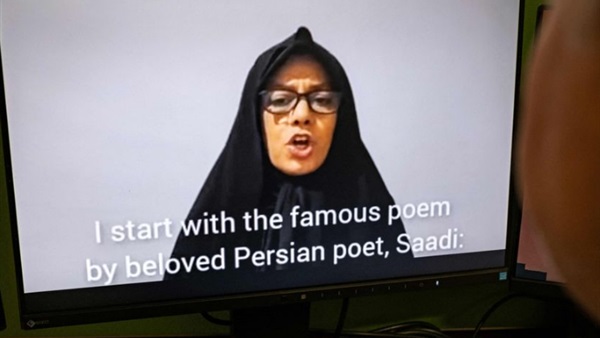Iran Arrests Supreme Leader’s Niece Amid Crackdown on Critics

Iran arrested a human-rights activist who is also the niece of Supreme Leader Ayatollah Ali Khamenei, according to her family, part of a growing effort by the country’s regime to crack down on those who are critical of its response to a two-month-old protest movement.
Iranian authorities arrested human-rights advocate Farideh Moradkhani on Wednesday after she went to a prosecutor’s office following a summons, her brother said over the weekend.
Ms. Moradkhani, whose mother was the sister of Mr. Khamenei, comes from a branch of the family that has publicly opposed his rule. In a video posted on YouTube by her brother on Friday, she called her uncle’s rule a “murderous and child-killing regime.” She also criticized what she says is the international community’s inaction and called on foreign governments to sever their ties with the Islamic Republic.
Over 15,000 people have been arrested since protests began in mid-September, and authorities are seeking the death penalty in at least 21 cases, according to Amnesty International.
The protests erupted after the death of Mahsa Amini, a 22-year-old Kurdish woman who died while in police detention in Tehran after allegedly violating the country’s strict Islamic dress code. Her death caused unrest in Kurdistan, where military forces have carried out an intense crackdown, and quickly spread to other parts of Iran.
At least 451 people have been killed in clashes with security forces since the protests erupted, according to the nonprofit Human Rights Activists in Iran. They include about 63 children, including a nine-year-old whose death on Nov. 16 has stirred renewed anger among demonstrators.
In response, the United Nations Human Rights Council voted last week to investigate the alleged human-rights abuses by Iranian authorities.
On Monday, a government spokesperson said Iran wouldn’t cooperate with the U.N. probe and blamed foreign powers for the unrest. “There is reliable evidence and precise information about the Western governments’ role in the riots,” Foreign Ministry spokesman Nasser Kanaani said.
The government has also sought to crack down on criticism of a militarized operation against protesters in western Iran’s Kurdish region. At least 42 people have been killed since mid-November, according to Amnesty International. Local residents said security forces brought in heavy weaponry such as mounted machine guns to use on protesters.
Jalal Mahmoudzadeh, a member of parliament from the Kurdish town of Mahabad, told parliament on Sunday that 105 people have lost their lives in the region since the unrest started, citing an unofficial count, according to statements posted on his Telegram channel and the semiofficial Mehr news agency. When he called the Interior Ministry to hold those responsible to account, “they filed a complaint before the judicial system against me, who is pursuing this matter,” Mr. Mahmoudzadeh was quoted as saying on both his Telegram channel and Mehr news.
The regime is also cracking down on journalists reporting on the protests. Iran’s judiciary is finalizing charges against Elahe Mohammadi, who was sent on assignment to cover Ms. Amini’s burial in the Kurdish city of Saqqez, which marked the beginning of the demonstrations.
At least 42 journalists have been arrested since the beginning of the protests, according to the Committee for Follow-Up on the Status of Detainees, a nongovernmental organization that tracks detentions in Iran.
A number of reporters for the semiofficial Iran Labour News Agency have been detained or contacted by security agencies who are trying to control their coverage, the organization said. One of them, Reza Asadabadi, was arrested by the Islamic Revolutionary Guard Corps last week and transferred to the Evin prison, which hosts a large number of political prisoners in Tehran, ILNA said.





